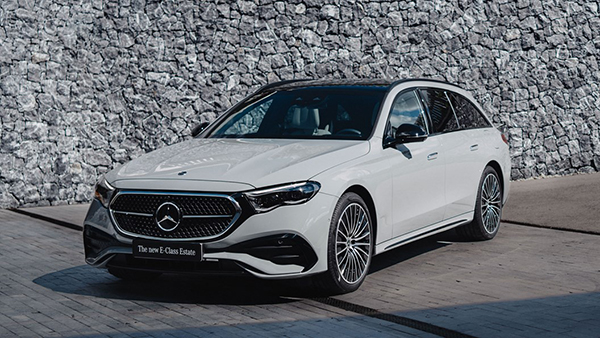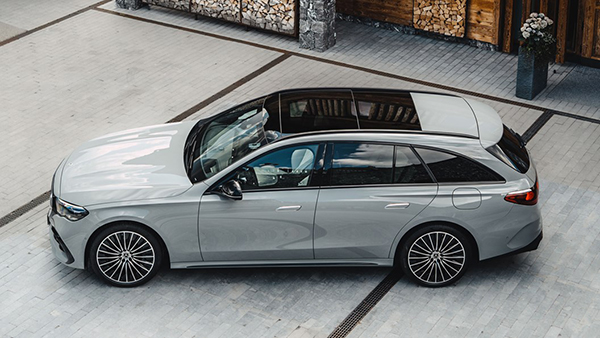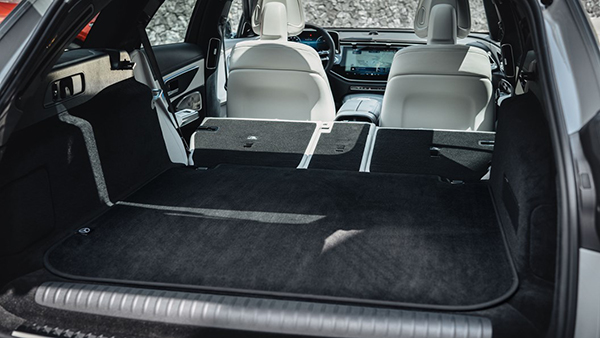In a move that should surprise no one, Mercedes has launched an estate version of the new E-Class. It went on sale in the UK from November 2023, becoming a fresh rival for some of the best estate cars on sale, such as the BMW 5-series Touring, Audi A6 Avant and Skoda Superb Estate.

Prices start at £57,930 for the E200 AMG Line Estate, stretching to £78,835 (and beyond, depending on options) for the E300e Estate in AMG Line Premium Plus spec.
Changes over the Mercedes E-Class saloon are concentrated on the rear end. The Estate has a much larger boot and a slightly taller roofline, which increases boot capacity from 540 litres to 615 litres while liberating a couple of extra millimetres of headroom for rear seat passengers.
This sounds good, but it’s worth noting the new Mercedes-Benz E-Class Estate’s boot is 35 litres smaller than the previous generation model’s – and if you specify it with a plug-in hybrid powertrain, boot capacity falls to 460 litres. That’s only four litres more than you get from the boot of a Ford Puma.
The E-Class Estate also features an air-sprung rear axle, which can level out the ride height when you pile weight into the boot. All-round air suspension will also be available as an optional extra.

Which engines are available with the E-Class Estate?
From launch, the E-Class Estate will be available with three engines. The cheapest model in the range will be the E200. It features a mild hybrid 2.0-litre four-cylinder petrol unit producing 201bhp and 236lb/ft of torque. Mercedes that’s enough grunt for a 0–62mph time of 7.8 seconds and a top speed of 144mph. Fuel economy ranges between 37.1mpg and 42.1mpg.
Above that, there’s the E220d. It’s powered by a mild hybrid 2.0-litre four-cylinder diesel engine with 194bhp and 325lb/ft of torque. Its 0–62mph time and top speed are slightly slower than the petrol model at 7.9 seconds and 143mph respectively, but it compensates for that with its superior fuel economy. In official WLTP tests, it achieved between 49.5mpg and 56.4mpg.
Stepping up again, there’s the plug-in hybrid E300e. It blends the E200’s 2.0-litre four-cylinder petrol engine with a beefy electric motor and a 25.4kWh battery pack for a combined output of 227bhp and 406lb/ft of torque. It’ll be the fastest accelerating model in the Estate range from launch with a 0–62mph time of 6.5 seconds, although its top speed is the lowest at 141mph.
But performance isn’t really the point of the PHEV – it’s efficiency. Mercedes says the E300e can achieve more than 300mpg on the WLTP combined cycle, although that figure requires you to charge the car regularly and make the most of its 70-mile electric-only range.
Is the Estate’s cabin as much of a tech fest as the saloon?
You bet it is. Like the saloon, you can specify the cabin with Mercedes’s new Superscreen infotainment system. It consists of three displays – one for the digital gauge cluster, a shared touchscreen for the centre of the dashboard and a separate touchscreen to keep your front passenger entertained as you drive along.
The screens are also compatible with third party applications, such as Vivaldi web browser, social media platforms such as TikTok and smartphone games like Angry Birds. You can even work in the E-Class’s cabin – the video conferencing app Zoom is compatible with the infotainment system and there’s a selfie camera mounted on top of the dashboard.

Will we get another E-Class All-Terrain?
Mercedes hasn’t officially acknowledged the existence of the next E-Class All-Terrain but Felix Korn, product manager for the E-Class and E-Class Estate, has hinted it’ll arrive in 2024. It’ll become one of the few cars left in the rough-and-tumble estate niche, rivalling the likes of the Ford Focus Active Estate, Dacia Jogger and Volvo V60 Cross Country.
Like the previous generation car, it’ll take the E-Class Estate’s body as a starting point and add lifted suspension, black plastic wheel arch extensions, tough front and rear bumpers and standard-fit four-wheel drive – all of which will allow it to tackle some light off-roading.
We challenged Korn about Mercedes’s decision to launch a new E-Class All-Terrain. We assumed that buyers who want a more rugged vehicle would simply opt for one of the company’s many SUVs instead, but Korn told us Mercedes is remaining committed to the segment.
Even though All-Terrain models are expected to only constitute between 2 and 3 percent of E-Class sales, he said this was a margin worth chasing because of the low cost of production. The off-road variant can be sent down the same assembly line as the conventional Estate – so why not make it?
Sadly, the All-Terrain model won’t be coming to the UK. Mercedes has no plans to launch it in right-hand drive markets – but maybe if we all protest enough, executives will change their minds.
2024 Mercedes-Benz E-Class Estate Arrives Priced From £58,000
05/11/2023
No Comments
Mercedes-Benz | Mercedes-AMG
Click to rate this post
[Total: 1 Average: 5]